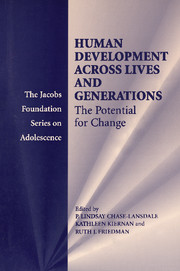Book contents
- Frontmatter
- Contents
- Figures and Tables page
- Contributors
- Foreword
- Acknowledgments
- HUMAN DEVELOPMENT ACROSS LIVES AND GENERATIONS
- Part I Introduction and Overview
- Part II Human Capital
- Part III Partnership Behavior
- 6 Cohabitation and Divorce across Nations and Generations
- 7 The Intergenerational Transmission of Couplelnstability
- 8 Strengthening Partnerships and Families
- Part IV Psychological Health and Development
- Part V Conclusion
- Index
6 - Cohabitation and Divorce across Nations and Generations
from Part III - Partnership Behavior
Published online by Cambridge University Press: 12 October 2018
- Frontmatter
- Contents
- Figures and Tables page
- Contributors
- Foreword
- Acknowledgments
- HUMAN DEVELOPMENT ACROSS LIVES AND GENERATIONS
- Part I Introduction and Overview
- Part II Human Capital
- Part III Partnership Behavior
- 6 Cohabitation and Divorce across Nations and Generations
- 7 The Intergenerational Transmission of Couplelnstability
- 8 Strengthening Partnerships and Families
- Part IV Psychological Health and Development
- Part V Conclusion
- Index
Summary
Introduction
Across many western nations there have been dramatic changes in partnership behavior, most noticeably the rise of cohabitation and divorce. Until recently for the majority of couples, marriage heralded the Start of first union, children were born and reared within marriage, and death typically terminated the marriage. Over recent decades, marriage has been transformed: with the rise in cohabitation and nonmarital childbearing it is no longer the exclusive marker of first union nor the preeminent context within which children are born; and life-long marriage has been eroded by divorce (Kiernan, 2001). In this chapter we examine these developments for a set of European nations and the United States, looking at how they are connected as well as their implications for children, families, and societies. Our perspective is both comparative and cross-generational.
The rise of cohabitation is undoubtedly among the most dramatic and rapid changes in partnership behavior in recent times and is increasingly receiving attention from social scientists and policy makers (Waite, Bachrach, Hindin, Thomson, & Thornton, 2000; Booth & Crouter, 2002; Unmarried cohabitation in Europe, 2001). In the first part of this chapter we investigate how far cohabitation has taken hold across nations. Data from a wide ränge of surveys including Eurobarometer Surveys, European Fertility and Family Surveys (FFS), the US National Survey of Family Growth and the British Household Panel Survey are used to examine a number of issues. First, we provide a picture of the incidence of cohabitation and marriage across nations and also examine the changes that have occurred across generations in partnership behavior. We show the extent to which people commence their first union with a marriage and how this has changed over time. Second, we move our focus to parenthood and examine the partnership context within which children are born in terms of whether they are born within or outside of marriage. For this latter group we make a further important distinction between children born to cohabiting parents and those born outside of a co-residential partnership. Third, we investigate whether the partnership context within which children are born enhances or reduces the risk of them seeing their parents separate.
- Type
- Chapter
- Information
- Human Development across Lives and GenerationsThe Potential for Change, pp. 139 - 170Publisher: Cambridge University PressPrint publication year: 2004
- 22
- Cited by



